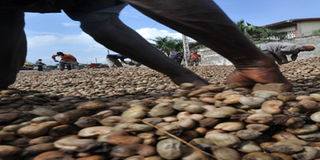Farmers uproot cashew trees as market woes bite

Farmers spread cashew nuts to dry under the sun. PHOTO| FILE
What you need to know:
- As a result, farmers have been felling cashew plants, leave them to dry and burn charcoal for sale.
Tanga. A poor cashew procuring system is discouraging crop farmers in Mkinga District in Tanga Region.
As a result, farmers have been felling cashew plants, leave them to dry and burn charcoal for sale.
A report by Agri-Link Tanzania for Outgrower Company consultant Isaac Ndamanhyilu has established that farmers feel being given a raw deal and that is why they have been uprooting plants.
The study findings show that most farmers are engaged in subsistence cashew farming and therefore get little margins.
The study identified challenges such as poor field management, poor cashew tree management, unreliability of sufficient quality plantings, and little knowledge on crop protection practices.
The study also found that there are few and weak groups that deny farmers the opportunity to benefit from both economies of scale and learning.
“The findings of the study indicate that there might be a problem in managing farmers in cashew farming as most of them are not organised into formal groups. The situation creates problems in organising farmers for procuring and service provision. This denies them an opportunity from economies of scales and learning,” he pointed out.
The study also established that the majority of farmers practise subsistence farming hence lack entrepreneurship skills, though it was demonstrated by the income statements that farmers can make greater margins with more training on entrepreneurship.
The study showed that the presence of the Mkinga Local Government Authority, Naliendele Agricultural Institute and the Cashewnut Industry Development Trust Fund is an advantage that the Outgrower Company could tap and work in collaboration with them to share resource and be able to perform better.
The study has shown that most cashew fields in Mkinga are almost ignored. “In the few fields where the farms are cleared, farmers do so to plough and plant perennial crops like maize, cassava and others for house consumption.”
The study evaluated some areas in the farm which need attention. They include field sanitation where most of the farmers have ignored their fields as they do not do any farm management especially weeding, slashing to reduce grasses in the field or thinning of the cashew tree.
This has led to tree infection and nutrition competition between cashew trees and grass the result of which has affected the quality and quantity produce of cashew from the respective trees.
Others are poor disease control. The majority of the farmers do not spray their trees against pests, losing a lot of flowers, hence little cashew nuts in the end.
Other areas that need attention are low production per tree caused by poor agronomic practices deployed on the trees. In some cases the trees have become too old to give the required production hence the urgent need for replacement with new ones.
Furthermore, Mr Ndamanhyilu says extension officers have insufficient facilities to make them move and reach the farmers to advise them on better crop husbandry practices.
“Where they do, some extension officers have little knowledge on cashew production to be able to advise the farmers properly.”



